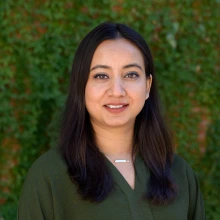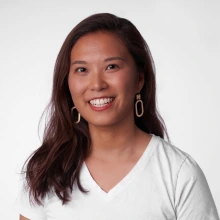2024 Graduate Student Highlights in the Health and Pharmaceutical Outcomes Track

As students across the Health Sciences campus begin their academic and professional careers, many wonder how they can take their passion for patient care and apply it on a far-reaching scale. For some pharmacy students, the answer has come in the form of the Health and Pharmaceutical Outcomes track. In this program, they have trained to become scientists with broad expertise in the foundational disciplines in one or more focused areas. The primary focus of research in HPO has been to improve health and healthcare delivery at the patient, health plan, and population level through the appropriate use of pharmaceuticals or pharmacy services. Now, these students are taking their knowledge, skills, and passions out in the world to make the biggest impact they can on a national scale.
"We take immense pride in the exemplary work our students are doing. Their achievements are a testament to their perseverance, determination, and passion for advancing health care. As they represent the college within the scientific community across the country, they inspire confidence in the future of pharmacy and demonstrate the lasting impact they will have on the profession," says David Rhys Axon, associate research professor and director of the Health and Pharmaceutical Outcomes Graduate Program.
To see how the HPO track has shaped young pharmacy professionals, take a look at what these graduate students have to say about the program and its impact.

Hina Zaidi | PhD Student, Grad Council Secretary, ISPOR Student Chapter Treasurer
Highlight - Presented her research on cognitive impairment and cardiovascular disease at the ISPOR 2024 in Atlanta and published a paper on shared decision-making and healthcare outcomes in HealthCare.
Zaidi is a third-year PhD student in Health and Pharmaceutical Outcomes track. Her research focuses on healthcare data analysis and advanced statistical techniques related to aging. At the ISPOR 2024 conference, she presented findings on association of cognitive impairment and cardiovascular disease management in older adults using pooled observational data, suggesting that antihypertensive medication use might be associated with a higher probability of age-related cognitive impairment, highlighting the need for further research on therapy timing and comorbidities.
What takeaways did you have from the conference?
- The conference was an invaluable experience. It highlighted the importance of interdisciplinary collaboration in healthcare decision-making. I particularly enjoyed sessions related to real world disease management strategies and machine learning in healthcare, which reinforced the value of leveraging real-world evidence in policy-making.
What interested you in joining ISPOR?
- ISPOR's commitment to advancing health economics and outcomes research resonates with my career goals. Joining ISPOR offered a platform to connect with professionals and academics passionate about improving healthcare decision-making globally.
Can you share more about your published paper?
- My recently published paper, Assessing the Association of Healthcare Resource Utilization and Patient-Reported Outcomes on Shared Decision-Making among Multimorbid Individuals, explores how shared decision-making (SDM) impacts healthcare utilization and patient-reported outcomes. Using 2020 Medical Expenditure Panel Survey data, the study found that individuals with optimal SDM were more likely to utilize healthcare services, such as outpatient visits and hospitalizations. These findings highlight the complex role of SDM in managing multimorbid populations and underscore the need for further research.
What advice would you give students when presenting research at a conference?
- Preparation is key, having a comprehensive understanding of your project is crucial. Practice explaining your research clearly and concisely, focusing on its relevance and impact. Lastly, engage with attendees during Q&A sessions; their feedback is invaluable for refining your work.

Anastasija Martinovic | MSPS Student
Highlight - Presented her research on BMI, cholesterol, and cancer at ISPOR 2024 and published the research paper in Journal Diseases.
Born in Leskovac, Serbia, Martinovic obtained a Bachelor degree in Pharmacy in 2012, and Masters degree in Pharmacy in 2015 at College of Pharmacy, University of Belgrade. She is currently pursuing a master’s degree in Health and Pharmaceutical Outcomes at the R. Ken Coit College of Pharmacy. Her interests changed from being a passionate chemist in high school – which brought her to the College of Pharmacy in the first place – toward more data driven and market based approach. After graduating in Serbia, she worked as a pharmacist for several years prior to moving to Arizona. Her current research focus is cancer, trying to observe different types from multiple perspectives since that is a problem that affects people globally. It is important to have the evidence from clinical trials, but also observational and economic data. She would be very happy to add at least one little piece to the cancer puzzle.
What about pharmaceutical sciences interests you?
- Various fields – from applied chemistry to Pharmacoeconomics. When it’s about Pharmacy, I find all the aspects both interesting and important.
What takeaways did you have from the conference?
- Working in what seems to be a niche field at the university with so many different options and degree tracks, a trip to a professional community where people who are devoted to the field come to work and discuss together is a fascinating experience. For a new student, it indeed seems as the entire new world filled with knowledge, camaraderie, and opportunities.
Can you share more about your published research?
- In my research I explored what kind of association exists between health indicators like Body Mass Index and Cholesterol level and Cancer from Real World Evidence perspective. Results showed both expected relations but also opened some new questions and offered new insights. Cancer prevention is crucial, and we should have as much data as possible on it in order to decrease its incidence and, primarily, protect people’s lives but also decrease financial burden.
What advice would you give students when presenting research at a conference?
- Prepare. First, the results that are presented need to be compelling, effectively and clearly presented, and you should have the ability to discuss various avenues of research related to your work. Second, know your audience. Check what people close to you in the community are working on and keep that in mind when presenting your research to them.
What are your goals after graduation?
- This journey brought me some new experiences, skills, and interests which I did not entirely think of before starting this program. My goal after graduation would be to widen my knowledge and experience in this field and see where I am going to settle. Honestly, I am looking forward to find out!

Yunrong Shen | PhD Student, ISPOR Student Chapter Vice President
Highlight - HEOR summer intern, published Nonemergency Medical Transportation Benefit in Traditional Medicare Advantage and Value-Based Plans in BeiGene and JAMA Network Open.
Yunrong is a third-year PhD student in the Health and Pharmaceutical Outcomes track. Her research interest lies in using large scale data to investigate patients and treatment outcomes. She is passionate about using her skills to make innovative treatments affordable and accessible to patients. In her free time, she enjoys hiking, cuddling with her cat and hanging out with her friends.
Tell us more about your internship!
- In the summer of 2024, I worked as a summer intern at BeiGene, a global pharmaceutical company specializing in oncology treatments. During my internship, I worked with BeiGene's Health Economics and Outcomes Research (HEOR) team to generate evidence supporting the value of the company’s products. I worked closely with the Patient-Reported Outcomes (PRO) team, conducting a targeted literature review on PRO instruments used in diffuse large B-cell lymphoma clinical trials. Through this work, I identified unmet needs in the field and proposed future directions for additional research.
What did you learn during your internship?
- This internship gave me invaluable first-hand experience in how Health Economics and Outcomes Research (HEOR) operates within the industry. It also taught me how to collaborate effectively across functions in a fast-paced environment.
Can you share more about your published research?
- Over one in five adults without access to a vehicle or public transit reported skipping necessary healthcare appointments due to a lack of transportation. Transportation is a critical social determinant of health that healthcare systems must address. Our study, utilizing Medicare Advantage plan data published by the Centers for Medicare & Medicaid Services (CMS), found that value-based plans were more likely to provide non-emergency transportation benefits to enrollees than traditional plans between 2020 and 2024. Additionally, these plans were less likely to impose restrictions on benefits, such as copays, referrals, or prior authorizations. This underscores CMS's commitment to addressing patients' social needs. Clinicians, facilities, and healthcare systems should collaborate with patients to ensure they fully utilize these benefits.
What about pharmaceutical sciences interests you?
- I’ve always been deeply inspired by the innovations in pharmaceutical sciences. It’s incredible to think about the progress we’ve made, and I hope that one day we’ll discover a cure for cancer.
What advice would you give students pursuing this path?
- This path is not an easy one—it demands perseverance and dedication. Be sure it's truly what you want before committing to it.
What are your goals after graduation?
- I aspire to work as a researcher for a pharmaceutical company, focusing on demonstrating the value of innovative therapies. By showcasing their benefits, I hope to help new treatments gain insurance coverage more quickly, enabling patients to access them sooner.

